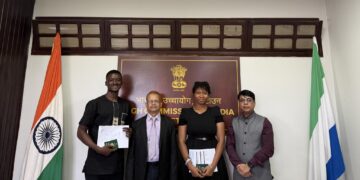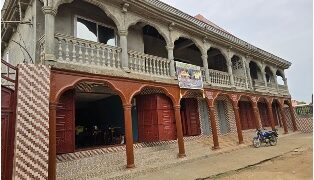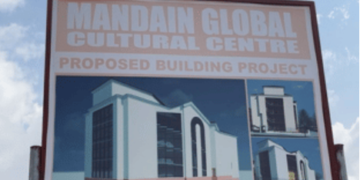Tuesday 1st April 2025
By: Zacharia Jalloh, Strategic Communications Unit, Ministry of Information and Civic Education
The Ministry of Information and Civic Education weekly press conference on Tuesday, April 1, 2025, addressed key national issues ranging from governance and civic engagement to national security and youth empowerment. Minister Chernor Bah emphasized the need for inclusive communication in governance, while the National Security Coordinator, Abdulai Caulker, provided updates on the country’s security situation and the ongoing Yenga border dispute. The following are the Key Highlights:

♦ Civic Engagement and Language Policy
The Minister of Information and Civic Education, Chernor Bah, emphasized the importance of civic engagement and citizen participation in governance. He argued that governance discussions should be conducted in Krio to enhance understanding among the populace. The minister pointed out that during political campaigns, politicians address citizens in Krio, yet governance and policymaking continue to be conducted predominantly in English. To address this, he disclosed that his ministry is working on a new bill to ensure that English is not the only official language of Sierra Leone.

Minister Bah also extended an apology to the public for the unavoidable absence of the Minister of Employment, Labour, and Social Security, Mohamed Rahman Swaray, who was attending to other equally important state matters.
♦ National Security and Stability
The National Security Coordinator at the Office of National Security (ONS), Abdulai Caulker, reassured citizens that Sierra Leone remains peaceful and stable. He noted that the country is currently at Level One security status, meaning there are no immediate threats to national stability. However, he stated that security measures have been enhanced across the country, particularly in border areas, to maintain peace and prevent any disruptions. He urged citizens to remain calm and go about their daily activities without fear.
♦ Yenga Border Dispute
Addressing the ongoing border dispute between Sierra Leone and Guinea over Yenga, Mr Caulker assured the public that the issue would be resolved peacefully. He referenced the 1974 Non-Aggression Treaty between the two countries, which stipulates that disputes must be settled through diplomatic means rather than force. As part of these efforts, both nations have established a Joint Technical Commission to resolve the Yenga issue and other border infractions.
Mr. Caulker revealed that a crucial meeting took place in Kailahun from March 24-30, 2025, where representatives from both countries presented historical documents on their respective borders to African Union facilitators for further analysis. He described the meeting as the most productive engagement between Sierra Leone and Guinea on border disputes in recent years. He also announced that the Joint Technical Commission will reconvene in Guinea to continue discussions and present additional documentation to help reaffirm the official border lines.
♦ Lantern Parade Suspension
Mr. Caulker also announced that the proposed Lantern Parade has been put on hold indefinitely due to security concerns. He explained that some fugitives from the failed coup attempt of November 26, 2024, remain at large, and the security sector is not willing to take any risks. However, he clarified that the government of Sierra Leone had never officially announced the return of the Lantern Parade. Public expectations for the event arose after a leaked memo indicated that a meeting was scheduled to discuss its potential resumption.
♦ Civic Day Series and Youth Empowerment
Ambassador Isatu Moses, Chairperson of the Kambia District Youth Council, commended the Ministry of Information and Civic Education for launching the Civic Day Series, an initiative aimed at bringing governance closer to the people. She expressed gratitude that the first Civic Day was held in Kambia District and urged Minister Bah to include the Free Quality Education (FQE) program in the constitutional review. She explained that school-going children and teachers in Kambia want the FQE program to be enshrined in the constitution to ensure its continuity under future governments.
As a strong advocate for youth empowerment, Amb. Moses also called on the government to ensure that development quotas allocated to Kambia District’s youth reach the rightful beneficiaries. She emphasized the need for transparency and equitable distribution of opportunities to enhance youth participation in national development.






















